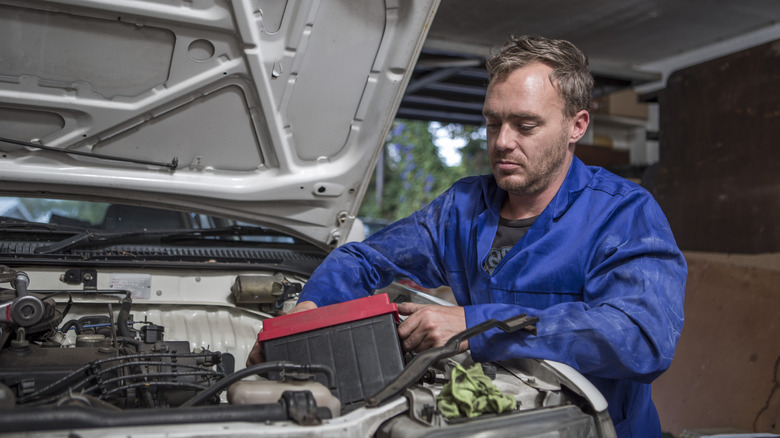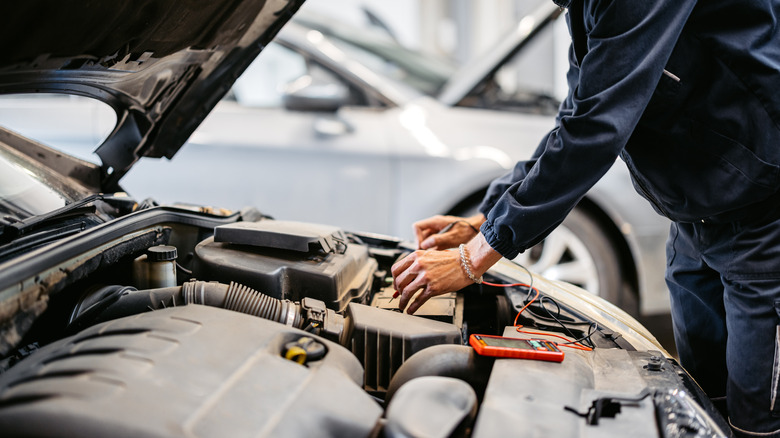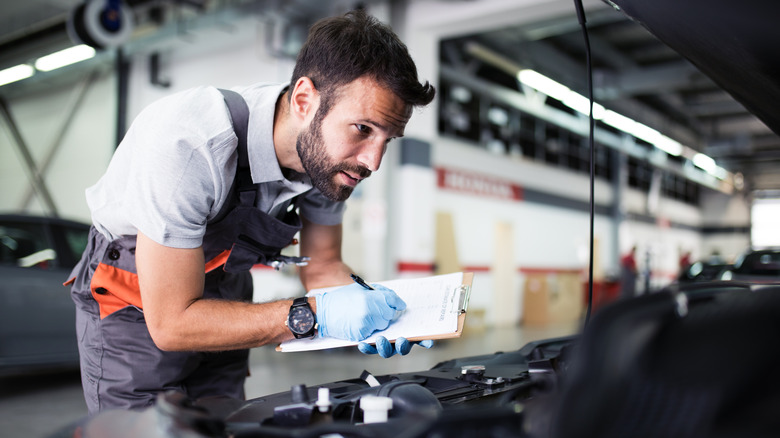Is It Safe To Buy A Used Battery For Your Car?
Nobody wants a dead car battery. Few things come with as much frustration as going to start the car and getting one of those tell-tale signs of a dead battery. If you don't want to (or can't afford to) shell out for a whole new battery, buying a used car battery could be a cost-effective solution. After all, new car batteries can be expensive, and a used battery offers a more budget-friendly (not to mention environmentally conscious) alternative.
Salvage yards and other sellers often have a variety of used batteries available, some of which still have a significant lifespan left. That said, just because they're available for sale doesn't inherently mean they're safe to buy. While the lower cost is appealing, purchasing a used car battery comes with risks. A battery's history can be unclear, and its remaining lifespan might be difficult to determine at first glance. Without careful inspection, a used battery could fail prematurely or even pose safety hazards. Here's what to know.
Key factors to consider before buying a used car battery
One of the biggest concerns when purchasing a secondhand battery is its reliability. A battery's performance depends on several factors, including its age, condition, and even the weather. Some used batteries may function almost as well as new ones, while others could be on the brink of failure. Additionally, there is a potential risk of fire or explosion if the battery has suffered any damage. Therefore, it's essential you take the necessary precautions before purchasing a used battery — not only for your safety but also for its longevity.
Another crucial factor to consider is the battery's age. Car batteries typically last between three to five years; the older the battery, the less likely it is to provide long-term reliability. To determine a battery's age for yourself, look for a date stamp. Manufacturers typically use a letter-and-number system, where the letter represents the month (A for January, B for February, and so on), and the number indicates the last digit of the manufacturing year. (For example, a battery marked "C9" was probably produced in March 2019.) Naturally, choosing a newer used battery increases the chances of getting better performance.
The importance of warranties and inspections
Another thing to inspect before buying a used car battery? Visible signs of corrosion or other indicators of poor physical condition. Over time, batteries develop corrosion, which appears as a green, orange, or blue substance around the terminals. Corrosion affects a battery's ability to hold a charge and is a pretty reliable sign of internal damage. You'll also want to check the battery casing for cracks or leaks, as these are signs of wear that could lead to failure. If possible, testing the battery before purchase using a voltage meter or seeking the expertise of a technician can provide further assurance of its condition.
Even though a used battery is not new, some sellers still offer a limited warranty. This warranty can provide peace of mind in case the battery goes out not long after your purchase. Before buying, check whether the salvage yard or seller provides any warranty coverage. (On that note, you should also check to make sure your vehicle's warranty allows the use of a used battery, as some may have specific battery terms.) In the end, purchasing a used car battery can be a smart financial decision if done correctly. By carefully inspecting the age, condition, and warranty coverage, buyers can minimize risks and maximize the value of their purchase.


